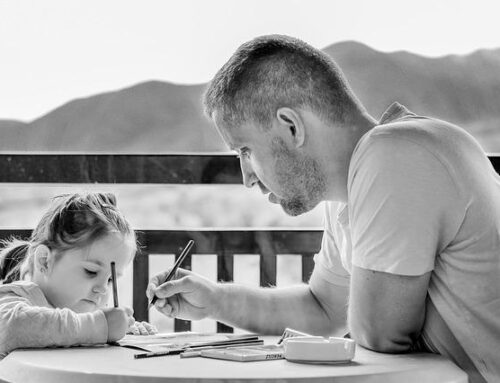During my pregnancies, my husband and I chose to wait until birth to find out the sex of each baby. A midwife myself, I found these “surprise” births to feel extra-joyous for all involved. When my first baby arrived – suddenly, quickly, and a month early – my biggest surprise wasn’t learning “it’s a girl”. It was the feeling of shock and confusion, to look at this wet red baby on my chest, and realize she was a stranger. There was nothing magical about the pregnancy or birth that meant we were instantly bonded. I loved her, and felt immensely protective of her, but I didn’t know anything about her.
Bonding is a process, not a moment. An infant’s primary psychological task is to develop trust; essentially, the baby needs to feel safe and secure. The baby learns that when he has needs, those needs will be met: with food, warmth, a dry diaper, a gas bubble resolved, a more comfortable position, or a familiar voice and smell. The baby bonds and attaches to caregivers that respond to his needs.
Response is a key word here. “Maternal instinct” implies that motherhood grants implicit parenting knowledge, but of course this is not true. The instinct is the drive to try – it is the pull of protectiveness, vigilance, and caring. A new parent will not always get it right on the first try. The baby communicates her needs in the only way she can, by crying. She may feel hunger, cold, wetness, pain; she may simply feel alone. So, the caregiver responds, comforts, and attempts to meet her needs. Over time, the caregiver becomes more attuned to their baby’s needs, personality, and temperament.
In this way, secure attachment is a learning process for both the infant and parent. Trauma therapy utilizes attachment theory by helping individuals connect to, and build upon, core feelings of security and safety. Parents cannot keep their children from all adversity and challenges in life, but the foundation of secure attachment is a gift for their future development and mental health.
Let’s be honest for a moment here about the bonding journey. It can be hard, thankless work. These babies demand a lot, and don’t even respond with a smile for 6 weeks! It is ok to feel confused and unprepared, and it is ok to need help and support along the way. Depression and trauma can impact a parent’s ability to respond, contribute to feelings of disconnection, and result in a cycle of guilt and self-doubt. The hypervigilance and protectiveness that comes with caring for a helpless infant can exacerbate anxiety, and make it harder to ask for or accept help. Peer support groups and mental health counseling provide critical validation and support. Postpartum Support International is a great place to start to find national and local resources for perinatal families.
My oldest daughter is 10 years old now, and I can say for sure that the learning process of parenting doesn’t stop. She still surprises me, but she’s no longer a stranger. Helen is a Psychiatric-Mental Health Nurse Practitioner at the Center for Trauma, Stress and Anxiety in Bel Air and Nottingham, Maryland. She is a former Nurse-Midwife and mother of two children, and specializes in treatment of perinatal mental health disorders. [If you need mental health support on your pregnancy or postpartum journey, check out Postpartum International’s resources at https://www.postpartum.net/ or contact The National Maternal Mental Health Hotline: Call or text 1-833-943-5746 ]





Leave A Comment